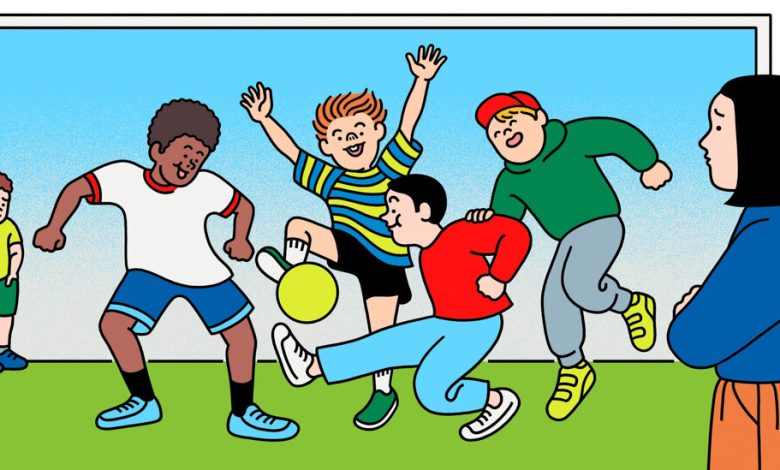My Son Refuses to Play With an Outcast. Does That Make Him a Bully?

Our son plays with a group of children, ages 5 to 12, on our block. One boy is regularly excluded. He doesn’t play well with others, is verbally and physically aggressive and, I’ll admit as a parent, a pretty annoying kid.
We recently found out that his father died years ago and his mother recently passed away. He moved here to live with his aunt along with two older siblings. We’ve tried being friendly with the aunt, but she is too overwhelmed with her new situation.
We’ve explained to our son that he must include the boy, no questions asked, but the message fails to register with him, given peer pressure from a group that has already exiled the new kid. How do we navigate this awful situation? Do we have a conversation with the other parents so we’re on the same page, or is that gossiping? Most important, are we raising a jerk who has no empathy? — Name Withheld
From the Ethicist:
I admire your concern for this unfortunate boy; I also wonder why you think you can simply dictate a solution. You’ve told your son that he “must include the boy” in the group play you describe — “no questions asked.” So let me ask the questions. How would he do this? Unless he has remarkable power of charisma such that he can bend others to his will, he can’t make a decision for the group. All he can do on his own is to withdraw from it and devote himself grimly to your mission. How will that turn out? Kids aren’t always good at feigning friendly feelings.
“You can’t say you can’t play”: That’s a rule you can try to implement, as the educator Vivian Gussin Paley did, in a tightly supervised kindergarten space where aggression is also policed. But Paley, a great believer in “the kindness of children” (the title of one of her books), wasn’t a no-questions-asked type. She invited dialogue among older kids and listened to what they had to say about the ideal.
The free-form activities of kids on a block, in any case, represent a very different situation from that of her kindergarten class. And children who have been raised to be wary of aggression may well avoid those who exhibit it. That’s how “pro-social” norms perpetuate themselves: untoward aggression is penalized through social sanction, which is the main instrument these kids have at their disposal. You find the kid annoying, but it’s easy for you to issue your edict because — as your child could remind you — you don’t have to play with him. How much time do you choose to spend with people you find annoying and inappropriately aggressive?
We are having trouble retrieving the article content.
Please enable JavaScript in your browser settings.
Thank you for your patience while we verify access. If you are in Reader mode please exit and log into your Times account, or subscribe for all of The Times.
Thank you for your patience while we verify access.
Already a subscriber? Log in.
Want all of The Times? Subscribe.



